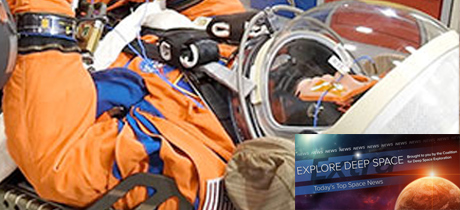In Today’s Deep Space Extra… Northrop Grumman’s 15th resupply mission departed the International Space Station yesterday for secondary activities. Russia launched the Progress 78 cargo mission to the International Space Station.
Human Space Exploration
‘Moonikin’ flying on NASA’s Artemis I named for Apollo 13 engineer
Collectspace.com (6/29): On Tuesday, NASA announced that a manikin aboard the Artemis I Orion spacecraft will be named Commander Moonikin Campos in honor of the late Arturo Campos, part of the mission control team that ensured the crew of Apollo 13 returned safely after an oxygen tank failure. Campos wrote procedures that transferred battery power from the lunar lander to the command module housing the three astronauts for the return to Earth. The name “Campos” was selected by a public response to a list of eight candidate names, each with a NASA legacy. Commander Moonikin Campos will be equipped with radiation, acceleration, vibration, and other sensors for Artemis I.
Cygnus supply ship departs Space Station after four-month mission
Coalition Members in the News – NanoRacks, Northrop Grumman
Spaceflightnow.com (6/29): Northrop Grumman’s 15th Cygnus spacecraft departed the International Space Station (ISS) on Tuesday after a four-month stay that began with the delivery of over 8,000 pounds of science and supplies. The departure initiated a secondary mission for Cygnus, the deployment of five small satellites. The spacecraft, filled with 7,180 pounds of ISS trash, will make a destructive re-entry into the Earth’s atmosphere on Thursday.
Russia’s Progress cargo ship successfully launches to Space Station
Space.com (6/29): Russia’s Progress 78 resupply mission to the International Space Station (ISS) successfully launched from the Baikonur Cosmodrome in Kazakhstan on Tuesday at 7:27 p.m. EDT with a 3,600-pound cargo. The space freighter is on a course to dock with the ISS’s Poisk module on Thursday at 9:02 p.m. EDT. Late in its five-month stay at the ISS, Progress 78 will depart and redock at Russia’s Nauka Multipurpose Laboratory Module, which will launch as a new part of the ISS’s Russian segment in mid-July.
Space Science
Keep watching the skies: Asteroid Day is here
WTOP of Washington D.C. (6/29): Wednesday is International Asteroid Day, proclaimed an annual event each June 30 by the United Nations (UN) in 2016. The observance commemorates the June 30, 1908 impact of an asteroid over Tunguska in Siberia that leveled 800 square miles of forest with a force of 10 to 30 megatons. An even more powerful impact 66 million years ago is blamed for the demise of the dinosaurs and much of life on Earth at the time. Asteroid Day is meant to heighten the global public awareness of the threat to civilization posed by Near Earth Objects (NEO) and a need to identify and track their movements and prepare strategies to steer them away.
Other News
Federal employees give their agencies high marks for meeting their pandemic needs
Politico.com (6/29): NASA was named the best place to work among large federal agencies on Tuesday for the ninth year in a row. The assessment was conducted by the nonpartisan, nonprofit Partnership for Public Service and the global firm Boston Consulting Group. It was followed by the Intelligence Community, the Department of Transportation, the Department of Health and Human Services and the Department of Commerce. The Government Accountability Office took the top slot for midsize agencies and the Congressional Budget Office was the top-ranked small agency in 2020.
Falcon 9 launch scrub highlights airspace integration problems
SpaceNews.com (6/29): A SpaceX Falcon 9 launch was scrubbed yesterday due to an aircraft violation of restricted airspace. Both Air Line Pilots Association and SpaceX representatives expressed displeasure with the Federal Aviation Administration’s (FAA) oversight of the airspace activities leading to the setback. The issue of airspace integration came up at a June 16 hearing of the House Transportation Committee’s Aviation Subcommittee. At the hearing, Wayne Monteith, the FAA’s Associate Administrator for Commercial Space Transportation said that progress had accelerated on the Space Data Integrator, a tool that would provide launch information quickly to air traffic controllers and pilots, and that he expects to have the first operational test of the tool in the next few months.

